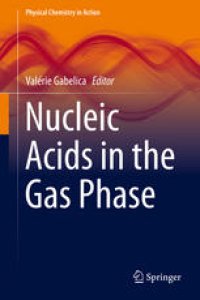
Ebook: Nucleic Acids in the Gas Phase
Author: Valérie Gabelica (eds.)
- Tags: Mass Spectrometry, Nucleic Acid Chemistry, Biophysics and Biological Physics, Spectroscopy/Spectrometry, Bioorganic Chemistry, Physical Chemistry
- Series: Physical Chemistry in Action
- Year: 2014
- Publisher: Springer-Verlag Berlin Heidelberg
- Edition: 1
- Language: English
- pdf
This book gives physical chemists a broader view of potential biological applications of their techniques for the study of nucleic acids in the gas phase. It provides organic chemists, biophysicists, and pharmacologists with an introduction to new techniques they can use to find the answers to yet unsolved questions. Laboratory sciences have bloomed with a variety of techniques to decipher the properties of the molecules of life. This volume introduces techniques used to investigate the properties of nucleic acids in the absence of solvent. It highlights the specificities pertaining to the studies of nucleic acids, although some of the techniques can similarly be applied to the study of other biomolecules, like proteins. The first part of the book introduces the techniques, from the transfer of nucleic acids to the gas-phase, to their detailed physico-chemical investigation. Each chapter is devoted to a specific molecular property, and illustrates how various approaches (experimental and theoretical) can be combined for the interpretation.
The second part of the book is devoted to applying the gas-phase approaches to solve specific questions related to the biophysics, biochemistry or pharmacology of nucleic acids.
This book gives physical chemists a broader view of potential biological applications of their techniques for the study of nucleic acids in the gas phase. It provides organic chemists, biophysicists, and pharmacologists with an introduction to new techniques they can use to find the answers to yet unsolved questions. Laboratory sciences have bloomed with a variety of techniques to decipher the properties of the molecules of life. This volume introduces techniques used to investigate the properties of nucleic acids in the absence of solvent. It highlights the specificities pertaining to the studies of nucleic acids, although some of the techniques can similarly be applied to the study of other biomolecules, like proteins. The first part of the book introduces the techniques, from the transfer of nucleic acids to the gas-phase, to their detailed physico-chemical investigation. Each chapter is devoted to a specific molecular property, and illustrates how various approaches (experimental and theoretical) can be combined for the interpretation.
The second part of the book is devoted to applying the gas-phase approaches to solve specific questions related to the biophysics, biochemistry or pharmacology of nucleic acids.